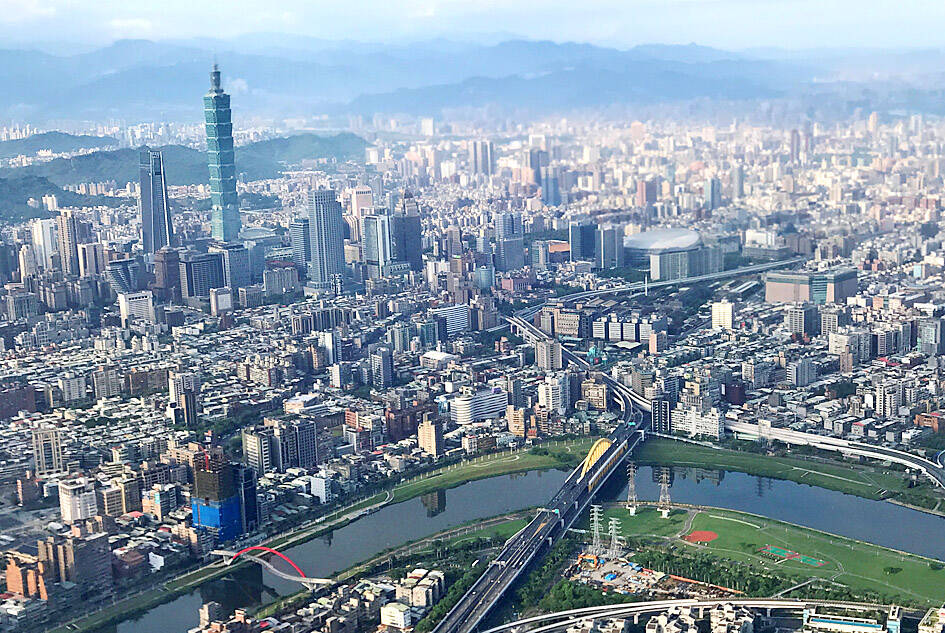Taiwan maintained its status as a “free” country in the latest edition of the Freedom in the World report published yesterday.
The nation scored 94 out of 100 in the report, which was compiled by Washington-based non-governmental organization Freedom House.
Taiwan ranked second in Asia behind Japan.

Photo: Tyrone Siu, Reuters
Taiwan received 38 points out of 40 for political rights and 56 out of 60 for civil liberties, identical scores to last year.
The report gives scores of zero to four points for each of 10 political rights indicators and 15 civil liberties indicators, which take the form of questions.
Taiwan retained “highly free” ratings with perfect scores in several areas, the report said.
Exceptions included the questions: “Is there freedom for trade unions and similar professional or labor organizations?” and “Do individuals enjoy equality of opportunity and freedom from economic exploitation?”
Taiwan was given three points for each.
Taiwan has a democratic system that has allowed for regular peaceful transfers of power since 2000 and robust protections of civil liberties, the report said.
However, there continues to be concerns about the exploitation of migrant workers and threats from the Chinese government amid its efforts to influence Taiwan’s policymaking, media and democratic infrastructure, it added.
A local #MeToo movement in May last year led to the passage of stronger protections for people affected by sexual harassment, it said.
Meanwhile, China continued to be rated as “not free,” garnering only nine points, the same as last year, the report said.
It was given minus-2 points out of 40 for political rights and 11 out of 60 for civil liberties, the report showed.
On a global level, freedom declined for the 18th consecutive year, driven by flawed elections and armed conflict, it said.
Civil liberties and political rights diminished in 52 countries or territories, while only 21 places improved, it said.

FREEDOM OF NAVIGATION: The UK would continue to reinforce ties with Taiwan ‘in a wide range of areas’ as a part of a ‘strong unofficial relationship,’ a paper said The UK plans to conduct more freedom of navigation operations in the Taiwan Strait and the South China Sea, British Secretary of State for Foreign, Commonwealth and Development Affairs David Lammy told the British House of Commons on Tuesday. British Member of Parliament Desmond Swayne said that the Royal Navy’s HMS Spey had passed through the Taiwan Strait “in pursuit of vital international freedom of navigation in the South China Sea.” Swayne asked Lammy whether he agreed that it was “proper and lawful” to do so, and if the UK would continue to carry out similar operations. Lammy replied “yes” to both questions. The

‘OF COURSE A COUNTRY’: The president outlined that Taiwan has all the necessary features of a nation, including citizens, land, government and sovereignty President William Lai (賴清德) discussed the meaning of “nation” during a speech in New Taipei City last night, emphasizing that Taiwan is a country as he condemned China’s misinterpretation of UN Resolution 2758. The speech was the first in a series of 10 that Lai is scheduled to give across Taiwan. It is the responsibility of Taiwanese citizens to stand united to defend their national sovereignty, democracy, liberty, way of life and the future of the next generation, Lai said. This is the most important legacy the people of this era could pass on to future generations, he said. Lai went on to discuss

MISSION: The Indo-Pacific region is ‘the priority theater,’ where the task of deterrence extends across the entire region, including Taiwan, the US Pacific Fleet commander said The US Navy’s “mission of deterrence” in the Indo-Pacific theater applies to Taiwan, Pacific Fleet Commander Admiral Stephen Koehler told the South China Sea Conference on Tuesday. The conference, organized by the Center for Strategic and International Studies (CSIS), is an international platform for senior officials and experts from countries with security interests in the region. “The Pacific Fleet’s mission is to deter aggression across the Western Pacific, together with our allies and partners, and to prevail in combat if necessary, Koehler said in the event’s keynote speech. “That mission of deterrence applies regionwide — including the South China Sea and Taiwan,” he

UNPRECEDENTED: In addition to the approved recall motions, cases such as Ma Wen-chun’s in Nantou are still under review, while others lack enough signatures The Central Election Commission (CEC) announced yesterday that a recall vote would take place on July 26, after it approved the first batch of recall motions targeting 24 Chinese Nationalist Party (KMT) lawmakers and Hsinchu Mayor Ann Kao (高虹安). Taiwan is in the midst of an unprecedented wave of mass recall campaigns, following a civil society push that echoed a call made by Democratic Progressive Party (DPP) caucus whip Ker Chien-ming (柯建銘) in January to initiate signature drives aimed at unseating KMT legislators. Under the Civil Servants Election and Recall Act (公職人員選舉罷免法), Taiwanese can initiate a recall of district-elected lawmakers by collecting